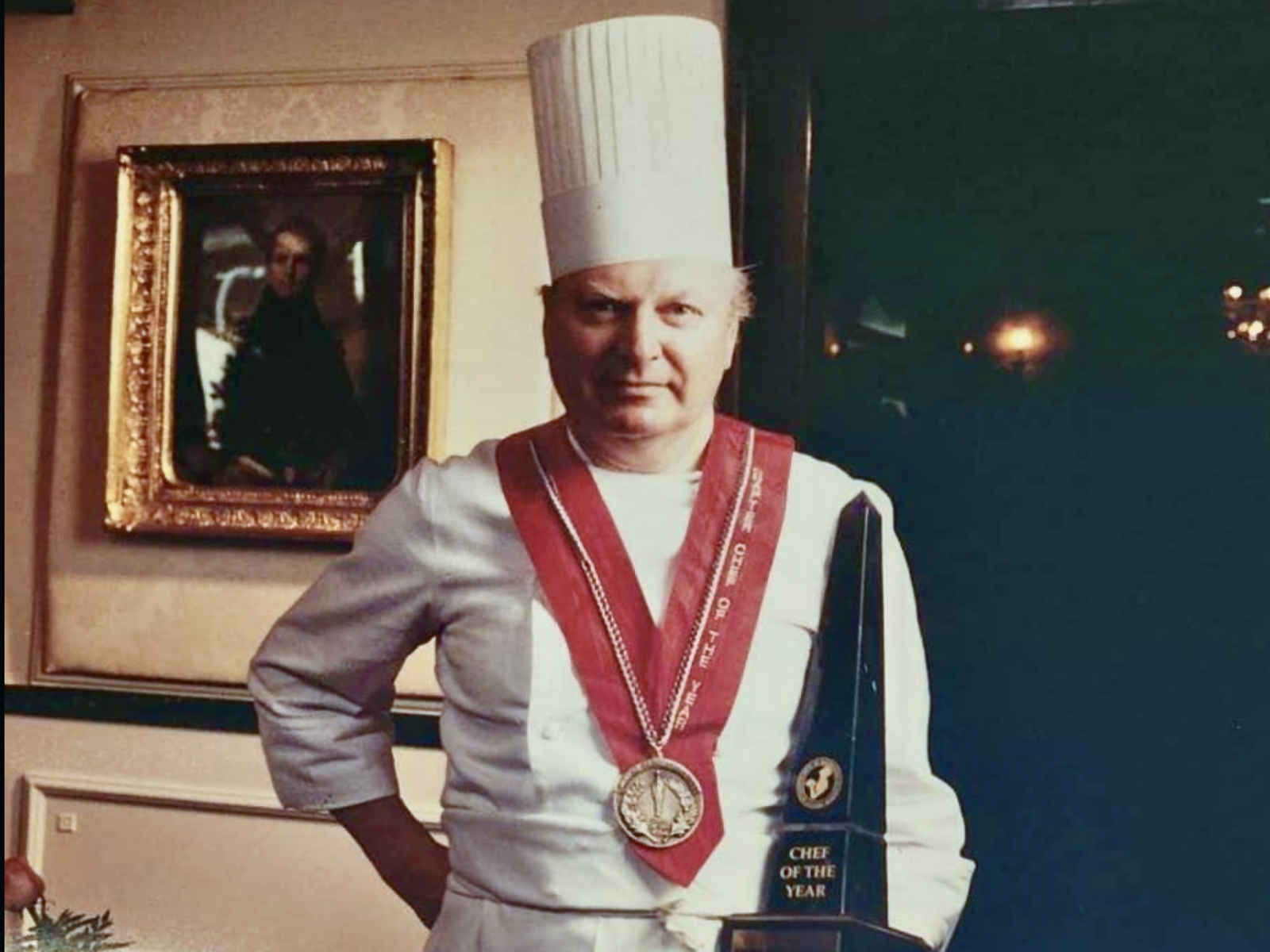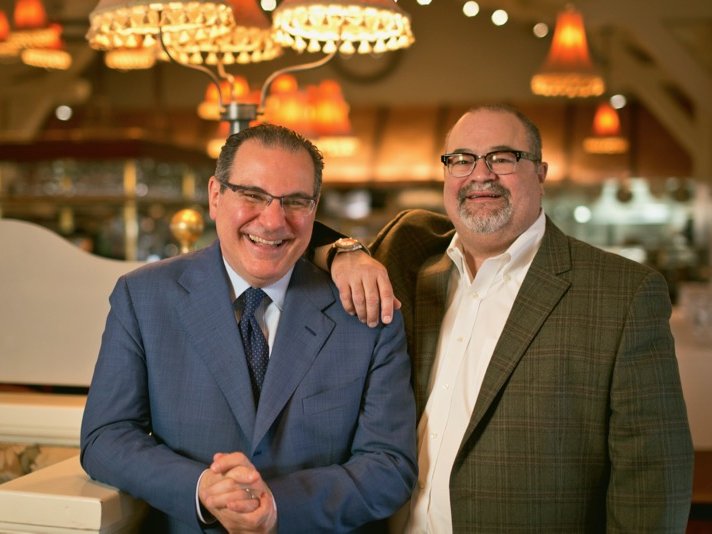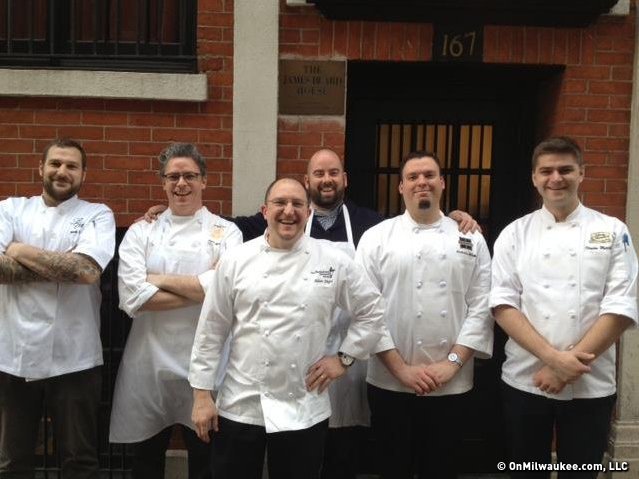Former Grenadier’s chef and co-owner, Knut Apitz, has died.
Apitz, who turned 84 in March, passed away around 10 p.m. on Saturday evening, Aug. 26 after a long battle with Parkinson’s Disease.
A celebration of his life will be held on Thursday, Aug. 31 at Schmidt & Bartelt, 10280 N. Port Washington Rd. in Mequon. The public visitation will be held from 10:30 a.m. to noon with a service to follow from noon to 1 p.m. A celebration will follow at Shully’s Watermark, 146 Green Bay Rd. in Thiensville.
Apitz's legacy
My memories of Grenadier's are few, though I vividly recall the rave reviews my mother gave the restaurant for its off-cuts, including veal sweetbreads and liver, which were among her favorite items to order when she and my father visited on a yearly basis to celebrate their wedding anniversary in the 80s.
As for me, I first met Chef Apitz in 2012 at a remarkable dinner held in his honor, which also raised funds for the Wisconsin Parkinson’s Association. Two years later, I had the even greater honor of interviewing him for my first book, “Milwaukee Food: A History of Cream City Cuisine,” which acknowledged his work in putting the Milwaukee food scene on the map.
The German-born chef began his career as an apprentice at a restaurant in Berlin before graduating from Berufsschule, a German culinary program.
“Early in my career,” Apitz told me during our conversation, “A chef advised me to try to work in the finest places I could get in to get as much experience as I could.”
He took the advice to heart, working in numerous positions in Germany, Holland, England and Switzerland before moving to Milwaukee to work at the Tripoli Country Club. In 1975, alongside colleague Robert Jordan, he opened Grenadier’s, a restaurant at 747 N. Broadway that would serve Milwaukee diners for nearly 30 years before closing in 2004.
When we met, he brought with him a variety of mementos he’d collected over the years. Among them was a large frame containing an article written by Fran Zell of the Chicago Tribune in 1978, just three years after Grenadier’s made its debut.
"With all its fine dining rooms, Chicago has nothing, except perhaps for its exclusive private clubs, quite like Milwaukee's Grenadier's,” Zell wrote.
And Zell was not speaking in hyperbole. During its heyday in the 1980s, the restaurant set the standard for fine dining in Milwaukee. It represented a style of dining found only in Michelin-starred restaurants in Europe. That meant white tablecloths, dark-suited waiters and menu items like sweetbreads, wild boar, venison and Tournedos Rossini.
Apitz was known for his ability to produce delicious dishes on the fly. In addition to a standard menu, he would entertain special requests from diners, often serving as many off-the-cuff specials as regular restaurant offerings. It was all a part of his dedication to excellent customer service. “If you came in and you had a wish, we wouldn’t say, ‘No, we don’t do that,’” Apitz said. “We would say, ‘Yes, ma’am’ or ‘Yes, sir.’”
It was only on rare occasions that he was unable to deliver on customer requests. He recalled entertaining a group of businessmen from New York in the 1980s. As they talked, one of the men challenged Apitz. “I have the urge for an elephant ear on a bun,” the man noted. Apitz’s retort was classic: “I’m sorry, but we are out of buns.”
As of 1996, Grenadier's was the only restaurant in Milwaukee to have received a four-star rating from the Mobil Travel Guide, a national guide to restaurants and hotels.
Throughout his career, Apitz was generous with his knowledge and he passed along his experience and skill to numerous chefs who worked alongside him. Chefs – including Joe Muench of Black Shoe Hospitality, Todd Leech of Rare Steakhouse, Scott Shully, co-founder of Shully’s Cuisine and Joe Roberson of Palát Catering – remained in Milwaukee and made names for themselves here, while others went on to pursue their careers nationally.
He was also a longtime supporter of the Milwaukee Area Technical College’s culinary program, where he served as an instructor. Today, aspiring chefs can receive support for their culinary educations through a Wisconsin Restaurant Association Education Foundation endowment that bears his name.
Apitz's efforts won him the affection of many, including a variety of professional associations to which he belonged. In 1993, Apitz was honored with the Wisconsin Restaurant Association's Chef of the Year, followed by honors as Chef of the Year by the American Culinary Federation, of which he was a founding member.
But, one of the things that truly set Apitz apart is that he excelled not only through his skill in the kitchen but also through service to the community as host and donor for countless charitable events, most notably those benefiting the Ronald McDonald House. Under his direction, the Annual Chefs’ Dinner became a tradition, sometimes involving as many as sixty chefs for each dinner. As the years progressed, Joe Muench began working with Apitz on the diners. Eventually they co-chaired the events, and ultimately – as Apitz’s health declined – Muench took over the planning entirely.
In light of his passing, I spoke with a smattering of folks whose lives were impacted by the life and work of Apitz. Here is what they had to say.
Uncle Knut
Craig Quinnies, Apitz’s nephew and godson, says that, among the many fond memories he has of his uncle took place on an evening very long ago. The two went out for a drink at a local tavern after which Apitz said “I will now take you to get the best burger in town." As they enjoyed their burgers at George Webb, Apitz asked him to keep quiet about his love for those burgers, at least while he remained on this earth.
"It was an example of his beautiful, professional, humble persona," Quinnies notes, years later.
Craig’s wife, Tricia (Penske) Quinnies, says that she and Craig went on one of their first dates at Grenadiers. “Knut treated us with a fabulous evening, and I remember him saying that it had been such a pleasure to prepare our meal.”
But food, it seems, was not only a professional skill for Apitz. It was his love language. He was a master at the grill for family gatherings, preparing items that ranged from Italian sausages to lobster and beef tenderloin (the latter is shown in the photo below).
Quinnies says that in 1995, when their son was born and had to remain in ICU, they received a kind gift from the Apitzs. “Knut and Ursula sent us a flourless chocolate cake. It tasted amazing and was such a balm for a stressful time. All these years later I always put the two together: Knut and the cake.”
“[This past] Saturday morning I woke up and headed to the Fox Point Farmers market for some of Matilda’s incredible bakery. And there was a flourless chocolate cake. I ate it with delight the morning of the day he passed.”
Golfing companion
Chef Michael Engel, owner of Pastiche – a restaurant where Apitz celebrated occasions, including his 76th birthday – says he remembers the day when Apitz enjoyed his first Cosmo.
“I knew Knut mainly through golfing with him and a group of other friends a couple of times a week,” says Engel, who submitted a photo taken after they’d scored first place in a benefit golf outing for the Parkinson’s Association. The photo depicts Knut Apitz with his (very first) Cosmopolitan. He’s sitting beside his nephew, Rick Quinnies (in the yellow hat).
“He always insisted on driving the golf cart, and I usually walked but would ride with him when he played. He drove like Mr. Magoo, hitting every hole, bump and tree branch out there. One day we were the only two who showed up and had a marvelous time. I asked him that one universal question we all get, ‘Why a Chef?’ and he talked for the next couple of hours about his life and career.
“Ursula would bring him to the restaurant every so often for Dover Sole, and I’d always try to sit for a while and visit. Once when he was struggling on the golf course, he looked up at me and said “Never give up,” which was how I always thought of him. He had immeasurable mental energy to deal with the deterioration of his body, and the grace to do as much as he could with the hand he was dealt. His wife Ursula gave him so much over the years. She is a saint and he’ll be missed.”
Chef, teacher and mentor
Chef Joe Parajecki, the current president of the American Culinary Federation Chefs of Milwaukee, recalls the days when he worked part-time at Grenadier’s following his graduation from MATC in 1988.
“Knut was very demanding, but he was also fair,” says Parajecki. “Everyone was treated equally. He wanted everything to be as perfect as possible and he got it. He always worked on teaching others what he knew and part of that was always doing the best that you could do, period. He taught us that it was up to us to set the standard. It’s what he did every day. And when you talk about who set the bar for fine dining in Milwaukee, Knut set that bar.”
Parajecki underscores that Apitz was, above all, a teacher and mentor.
“If you were interested in learning, he would share everything that he knew with you,” he recalls. “And I think that’s one of the qualities that makes a chef a good chef, and that is teaching. If you’re not sharing your knowledge, what good is knowing it?”
Todd Leech, Executive Chef at Rare Steakhouse, who worked for Apitz in the early 90s, says he took so much from the experience.
“He [Knut Apitz] was always very demanding, very intense in his style,” Leech recalls. “But his passion for food was like no other I've seen before or since. It’s where I learned the fundamentals of classical cooking...take no shortcuts.”
An "Old World" education
Chef Joe Muench of Black Shoe Hospitality, who worked at Grenadier’s for four years, also credits Apitz with giving him the foundation he needed to move forward in his career.
“I was very green when I started at Grenadier’s in 1990,” he says. “But four years later, I left capable enough to open Eddie Martini’s in Wauwatosa. It definitely impacted me.”
Muench smiles as he speaks of his first weeks in the Grenadier’s kitchen, noting that he had to learn not to mistake Apitz’s German outbursts for reprimands.
“I remember when I first started there…it took a bit of getting used to, my last name being Muench (which means ‘people’ in German),” he recalls, noting that Apitz would frequently pace around in the kitchen shouting "Goddammit muench!" when things would go awry.
But Muench says that Apitz’s approach – which was very much what chefs today would call “nose-to-tail” – not only informed his knowledge of seasonality and proteins, but gave him perspective on the work that went into the commitment to sourcing fresh, quality items.
“I think the culinary world now is very de-tuned in some respects,” he says. “When I was at Grenadiers, we broke down all of our meats by hand. Farmers came to us with game birds, including squab and quail, that we had to clean. We got live crabs, live lobsters. We processed bear and elk. And we learned things that no one needs to learn these days. So many things now have been simplified for a variety of reasons.”
Those years, he admits, reflected a tough, disciplined kitchen culture which has all-but-disappeared in today’s restaurants.
“He was the last of a generation. He had a very ‘old world’ view when it came to operating his restaurant. There was a discipline associated with how he worked that we simply don’t have today. He was tough on people. But he was also very fair and he worked just as hard as anyone. And ultimately, we made ourselves bigger and faster to keep up.”
Muench also developed an appreciation for Apitz’s sense of humor, noting that even as his health declined – causing him to bob his head and shake as he spoke – he responded to his condition with wit, rather than frustration.
On one occasion, he says, as Apitz struggled to speak without excessive movement, he stopped. “Look,” he said. “I’m like a martini: I’m never stirred, I’m always shaken.”
Lori is an avid cook whose accrual of condiments and spices is rivaled only by her cookbook collection. Her passion for the culinary industry was birthed while balancing A&W root beer mugs as a teenage carhop, fed by insatiable curiosity and fueled by the people whose stories entwine with each and every dish. She’s had the privilege of chronicling these tales via numerous media, including OnMilwaukee and in her book “Milwaukee Food.” Her work has garnered journalism awards from entities including the Milwaukee Press Club.
When she’s not eating, photographing food, writing or recording the FoodCrush podcast, you’ll find Lori seeking out adventures with her husband Paul, traveling, cooking, reading, learning, snuggling with her cats and looking for ways to make a difference.







